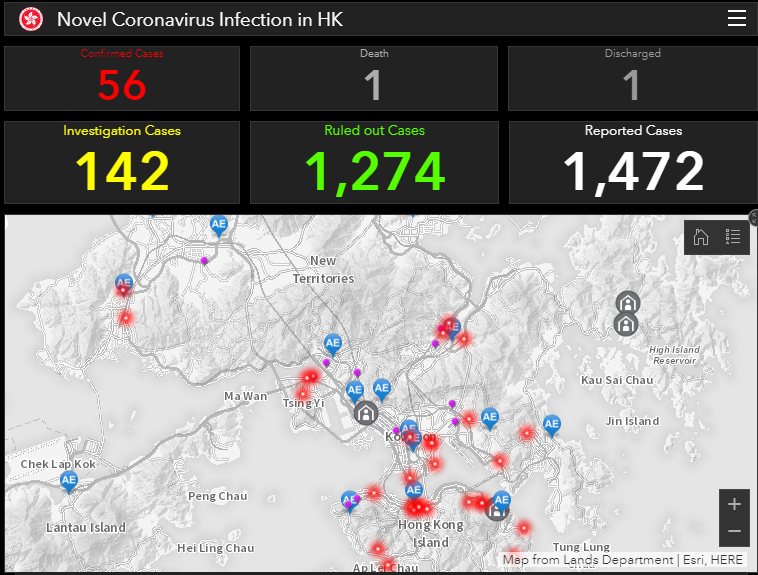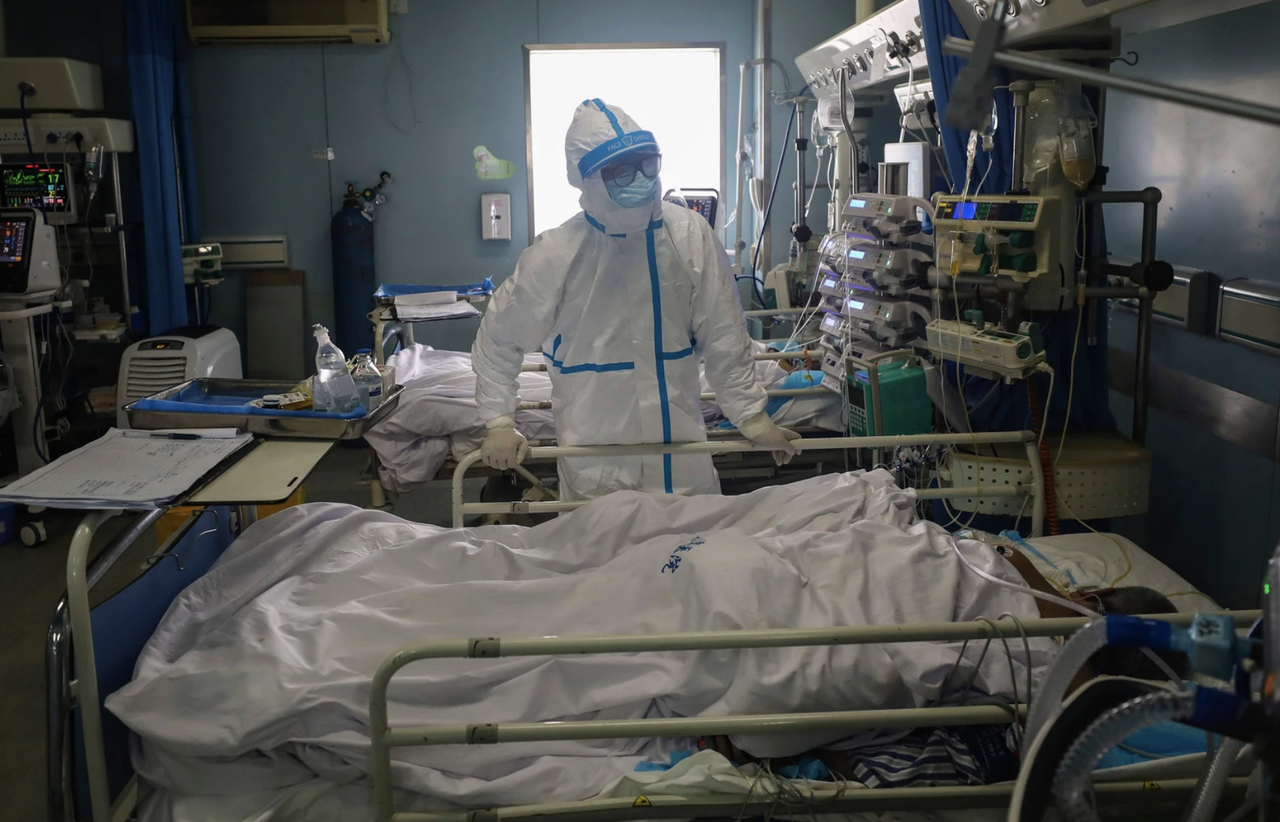WHO Turns On China, Demands To Know How Nearly 2,000 Doctors Were Infected With COVID-19

by
Tyler Durden
Zero Hedge
Fri, 02/14/2020 - 10:58
Summary:
- China says 1,716 medical workers have been infected
- WHO demands to know more about sick doctors, insists group of 12 virus experts will reach Beijing over the weekend
- Singapore reports largest daily jump in cases amid increased human-to-human transmission
- Hong Kong reports 3 new cases
- Hubei's new party boss orders quarantine tightened
- President Xi touts new "biosecurity law"
- Hong Kong Disney land offers space for quarantine
- Chinese company says blood plasma of recovered patients useful in combating the virus
- US mulling new travel restrictions
- Japan reports 4 new cases; one patient recently returned from Hawaii.
- CDC Director: Virus is "Coming" to the US.
* * *
Update (1040ET): The WHO has just wrapped up its now-daily presser for Friday, and it appeared to focus on imminent plans to send a group of a dozen scientists and researchers to Beijing to figure out exactly what the hell is going on.
Much fuss has been made over the past week over China's continued refusals to allow Americans, or any other foreigners, for that matter, to offer assistance with the virus response. It's almost as if they're...hiding something...
Even after yesterday's big reveal about the change in their 'pro forma accounting standards' to reflect a higher death toll and number of confirmed cases (the jump alarmed global investors and prompted a selloff on equity markets), China still won't let Americans participate in a WHO-sponsored team of 12 researchers who are traveling to the mainland.
It was a big deal earlier this week when Beijing said it would reluctantly accept the team, ending weeks of suspiciously standoffish behavior (though the WHO bigwigs did travel to Beijing for meetings). But as one analyst said earlier on CNBC: 'We want to see foreign boots on the ground before we simply take the Chinese at their word'.
It's also notable how the WHO, initially a purveyor of what seemed like propaganda hot off the presses in Beijing, seems to have turned completely against its benefactor, now treating it with public suspicion.
- WORLD HEALTH ORGANIZATION TEDROS SAYS WE NEED TO KNOW MORE ABOUT INFECTION OF 1,760 CHINESE HEALTH WORKERS, INCLUDING TIME PERIOD AND CIRCUMSTANCES
- WHO BOSS TEDROS SAYS HE EXPECTS FULL TEAM OF WHO-LED INTERNATIONAL HEALTH EXPERTS TO TOUCH DOWN IN CHINA OVER WEEKEND TO HELP PROBE CORONAVIRUS
- WHO MISSION TO CHINA WILL FOCUS ON UNDERSTANDING TRANSMISSION OF CORONAVIRUS, SEVERITY OF DISEASE AND IMPACT OF ONGOING RESPONSE MEASURES - WHO CHIEF TEDROS SAYS
- WORLD HEALTH ORGANIZATION TEDROS SAYS WE NEED TO KNOW MORE ABOUT INFECTION OF 1,760 CHINESE HEALTH WORKERS, INCLUDING TIME PERIOD AND CIRCUMSTANCES
But after today's WHO press conference, we were left with the distinct impression that it's almost as if China doesn't...want the team to come.
Why else would they have waited to reveal the figures about all the sick doctors and health-care workers until Friday morning in the US and Europe? Just a thought.
Back in the US, a team of American expertss is prepared to travel to China to investigate the outbreak on a moments notice, should they ever receive clearance from a government official, according to Secretary Azar.
As he said (and we noted) earlier, the US is bracing for the possibility that the warm weather doesn't kill the virus, as President Trump expects.
Anyway, moving away from China, we've seen unconfirmed reports of four patients in St. Petersburg escaping a COVID-19 quarantine. Earlier in the week, two women escaped quarantines in Siberia.
* * *
Update (1000ET): China is turning the quarantine nob up to '11'.
After imposing strict lockdown conditions on nearly a third of the country, Beijing's is kicking off its shift to 'wartime measures' by adopting even more strikingly draconian measures on the residents of its capital city.
From Feb. 14 on, all people returning to the city will be advised to quarantine for 14 days.
Meanwhile, the
BBC reports that hundreds of conference atendees in London have been contacted by health officials after one of them was later diagnosed with the virus.
The person, who has not been identified, attended the UK Bus Summit at the QEII Conference Centre last week. Two Labour MPs who attended the conference said they're cancelling public events until Feb. 20, just in case.
So far, nine people in the UK have been confirmed to have the virus.
* * *
Update (0915ET): Japan has reported 4 new cases of the virus, including
one man who recently returned from the US state of Hawaii, and another who helped transfer an infected patient diagnosed aboard "the Diamond Princess", the cruise ship that has been quarantined in Yokohama for 10 days.
Meanwhile, over in the US,
this interview of the director of the CDC warning that the virus could become widespread in the US 'beyond 2020'.
* * *
Update (0850ET): Health and Human Services Secretary Alex Azar said during an interview on Friday morning that more travel restrictions are "on the table," suggesting that the US might apply similar restrictions to Hong Kong, Singapore, Japan and other Asian countries that have reported rising numbers of cases.
Earlier this month, the State Department raised its travel alert for China to '4', and the US imposed restrictions on foreigners who have recently traveled to China and re-routing Americans who have been to viral hotspots to certain US airports for screening on arrival. These travel restrictions have infuriated Beijing, and prompted a government spokesperson to accuse the US of spreading hysteria.
Even if the virus does "go away" in April, as President Trump has insisted...
“We’re seeing very limited impact here in the United States, but that could change at any time,” HHS Sec. Alex Azar says about coronavirus. “We’re working...with states, local governments and the private sector so we’re ready if it gets here.”
https://t.co/Kosiam25fb pic.twitter.com/2xR0UwMuZz
— New Day (@NewDay)
February 14, 2020
...At this point, Q1 GDP is going to be a disaster anyway, so the US might as well kitchen-sink it.
And it's not like investors have anything to worry about - bad news is still good news, after all, and the market will simply go to pricing in ~1 Fed rate hike in 2020 to ~2.
* * *
Update (0810ET): Earlier this morning, Hong Kong confirmed three more coronavirus infections, bringing the total number of cases in the city to 56.

Here's more information on the new cases from
SCMP:
- The Centre for Health Protection said one of the three cases involved a man in critical condition after suffering shortness of breath for more than 10 days. He had to be intubated in Princess Margaret Hospital. He lives in Shek Lei Estate in Kwai Chung, and passed through the Lok Ma Chau border crossing on January 22.
- Another person who tested positive for the virus, which causes the disease known as Covid-19, was the cousin of a previously infected case. Both attended a family gathering of 29 at a restaurant in North Point on January 26. At least six other members at that gathering have been infected with the new deadly virus, while at least two are still in quarantine pending test results.
- The third case is a worker in a dim sum restaurant in Sheung Wan, whose husband visited their son in Xinhui, Guangdong province, from January 23 to January 28. Her husband and son are not infected.
Unlike most of the countries that have reported cases of the virus, both Singapore and Hong Kong have confirmed human-to-human transmission within their own borders, meaning the outbreak has already started to spread past the 2nd and 3rd generations of the infected.
Though Singapore is still ahead in terms of number of cases, Hong Kong is giving it a run for its month (though, as we've said before, it's an outbreak, not a race).
* * *
Following Chinese health officials' claim last night that it "double-counted" some deaths (while crematoriums in the country have been working 24/7 as the outbreak has worsened over the last few weeks), the good people at China's NHC have disclosed for the first time that 1,716 medical workers have been infected across the country.
Does this figure seem a little underwhelming? Officials put the infected medical worker total at 3.8% of 60k+ total cases on the mainland, and added that six medical workers - including the martyr Dr. Li - have died as of Friday. Of course, even if they're all wearing protective gear (which we know many aren't especially in the hardest hit areas like Hubei) this number would still seem low for such an infectious disease, given that more than 65,000 cases have been confirmed across the world.
One expert who spoke to the
New York Times said the number of infected medical workers is "concerning."
“I think it’s quite concerning,” said Benjamin Cowling, a professor of epidemiology at the University of Hong Kong. “Healthcare workers face the challenge of caring for a substantial number of patients in Wuhan. It’s worrying to discover that a number of them have been infected.”
From what we've heard and read, it seems that shortages of supplies like facemasks, gloves, goggles and other protective gear have persisted, even in Hubei, according to the NYT. During the SARS outbreak, 961 medical workers were infected, representing some 18% of all infections. Since COVID-19 is even more contagious than SARS, we'd expect the number of medical workers infected to be even higher.
After expressing skepticism about Beijing's response to the virus earlier in the week, it looks like the WHO is back to shilling for the Communist Party, claiming overnight that the jump in cases in China shouldn’t be characterized as a "spike," and that it’s normal to change how cases are defined.
Across the mainland, the Chinese people, who have been frustrated by the government's dissembling, have come up with jokes like this one.
How many monkeys died?
26 caves collapsed.
How many monkeys died?
Only 5K trees ruined.
How many monkeys died?
All alive moneys transferred to safe places.
How many monkeys died?
Relatives of the dead monkeys are emotionally stable.
How many monkeys died?
We saved one today.
https://t.co/KUh9O5IqiG
— 曾錚 Jennifer Zeng (@jenniferatntd)
February 14, 2020
Given everything we've learned about the virus, and all the reports about shortages of medical supplies like facemasks across the country, but especially in Hubei Province, we suspect that the real number is much, much larger. It's just the latest evidence that Beijing hasn't given up on doctoring its disease stats, even after its big non-admission on Thursday that its methods for confirming virus-linked cases and deaths hadn't been sufficiently inclusive.

As we first pointed out yesterday, party officials said yesterday that the country would use "wartime measures" - a kind of public emergency declaration - to fight the virus, suggesting that the lockdowns will become even more widespread.
China fights
#coronavirus with 'wartime' measures; Infected patient's daughter makes desperate plea
#COVID2019 #Coronavirus #CoronavirusOutbreak #coronaviruschina https://t.co/mYczlRVis1
— 曾錚 Jennifer Zeng (@jenniferatntd)
February 14, 2020
And as that happens, more scenes like these are playing out across the country.
First, they covered up the truth, second, they said this disease was preventable and controllable, third, they locked you up. Now they terrify you like this. What a hell! Terrorists are on the go.
#COVID2019 #Coronavirus #CoronavirusOutbreak #coronaviruschina pic.twitter.com/CuPpqRncur
— 曾錚 Jennifer Zeng (@jenniferatntd)
February 14, 2020
A real time photo from David Ng’s friend in
#Wuhan. Only 7 families have their lights on in a 30 level building; whilst usually every window was on. The friend’s own building has only 5 families’ lights on. How many have gone? You do your own math.
#COVID19 #coronavirus https://t.co/QjVv8t0kGw
— 曾錚 Jennifer Zeng (@jenniferatntd)
February 14, 2020
In more immediately alarming news, Singapore reported nine new cases overnight, the largest daily increase yet in the city-state, which is now reporting a total of 67 cases, leaving it in third place after mainland China and the 'Diamond Princess' (cases quarantined off the ship are being counted separately from domestic Japanese cases).
Meanwhile, as the quest for a vaccine continues, Chinese state media is reporting that the China National Biotec Group has found virus-neutralizing antibodies in the plasma of recovered patients. Experiments have shown that these antibodies can help kill the virus, potentially speeding up the timeline for a successful vaccine.
The company said it had successfully prepared the plasma for clinical treatment after strict blood biological safety testing, virus inactivation and antiviral activity testing. The plasma had been used to treat 11 patients in critical condition, with significant results, it said.
Here's more on that from
SCMP:
Clinical tests showed that, after 12 to 24 hours of treatment, the main inflammatory indicators in the laboratory decreased significantly, the proportion of lymphocytes increased, key indicators such as blood oxygen saturation and viral load improved, and clinical signs and symptoms improved significantly.
"The plasma product to treat the novel coronavirus is made from plasma loaded with antibodies donated by recovered patients. It went through virus inactivation and was tested against virus-neutralising antibodies and multiple pathogenic microorganisms," the company said, according to the report.
Following the scapegoating of two of the most senior party officials in Hubei, the province's new party boss, Ying Yong, held his first meeting on the outbreak with staff late Thursday, and immediately proceeded to lay down the law: He ordered officials to redouble their efforts to tighten quarantine controls in communities and neighborhoods across the province. This includes making sure that every individual suspected of infection must be quarantined.
In other news, China's zombie companies are breathing a sigh of relief after the Communist Party ordered the nation's banks to implement a loan default 'grace period' to ensure that China's mountain of bad debt doesn't come tumbling down like a house of cards.
Banks are told to tolerate higher bad loans and further raise tolerance for regions and industries hit hard by the virus
As the outbreak rages unabated and China struggles to get its economy back to work, the leadership in Beijing have continued to parrot the party line that the backlash for China's economy will remain minimal, with China's foreign secretary becoming the latest to assure the public that the economy will swiftly recover after a brief pullback.
President Xi said Friday that the country must improve its responses to major public health crises, and added that a new "biosecurity law" would soon be passed.
Chinese President Xi Jinping on Friday urged an improvement in the preventive mechanism in response to major public health crises and the country's public health emergency and management system. Xi also stressed the importance to roll out a biosecurity law as soon as possible.
pic.twitter.com/fOqxZJcRSA
— Global Times (@globaltimesnews)
February 14, 2020
Finally, readers who enjoy a little dark humor (we suspect that's most of you) should get a kick out of this: Disneyland Hong Kong has agreed to let the city government use its land for quarantine space.
ZeroHedge - On a long enough timeline, the survival rate for everyone drops to zero

www.zerohedge.com






